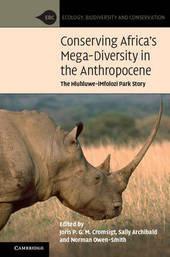
|
Conserving Africa's Mega-Diversity in the Anthropocene: The Hluhluwe-iMfolozi Park Story
Hardback
Main Details
| Title |
Conserving Africa's Mega-Diversity in the Anthropocene: The Hluhluwe-iMfolozi Park Story
|
| Authors and Contributors |
Edited by Joris P. G. M. Cromsigt
|
|
Edited by Sally Archibald
|
|
Edited by Norman Owen-Smith
|
| Series | Ecology, Biodiversity and Conservation |
|---|
| Physical Properties |
| Format:Hardback | | Pages:450 | | Dimensions(mm): Height 235,Width 160 |
|
| Category/Genre | Ecological science |
|---|
| ISBN/Barcode |
9781107031760
|
| Classifications | Dewey:333.72096 |
|---|
| Audience | | Professional & Vocational | |
|---|
| Illustrations |
28 Tables, black and white; 23 Plates, color; 61 Halftones, black and white; 20 Line drawings, black and white
|
|
Publishing Details |
| Publisher |
Cambridge University Press
|
| Imprint |
Cambridge University Press
|
| Publication Date |
2 March 2017 |
| Publication Country |
United Kingdom
|
Description
Centring on South Africa's Hluhluwe-iMfolozi Park, this book synthesizes a century of insights from the ecology and conservation management of one of Africa's oldest protected wildlife areas. The park provides important lessons for conservation management, as it has maintained conservation values rivalling those of much larger parks sometimes through, and sometimes despite, strong management interventions, including the rescue of the white rhino from extinction. In addition, the book highlights the ecological science produced in the park, much of which has become widely influential, including the megaherbivore concept, new functional approaches to understanding biomes, and new understandings about the role of consumers in shaping ecosystems. The volume is ideal for researchers and policymakers interested in the conservation of relatively small, isolated and protected areas.
Author Biography
Joris P. G. M. Cromsigt is an Associate Professor in Wildlife Ecology at the Swedish University of Agricultural Sciences. His research spans the broad field of the ecology of large mammals and their role in the functioning of ecosystems. He has over sixteen years of experience in working in South African savanna systems, much of this based in Hluhluwe-iMfolozi Park. Sally Archibald works on understanding the dynamics of savanna ecosystems in the context of global change. Her work integrates field ecological data, remote sensing, modelling, and biogeochemistry. She is involved in collaborative research projects on fire-grazer interactions, inter-continental savanna comparisons, the importance of land-atmosphere feedbacks, and pursuing a global theory of fire. Professor Archibald was a finalist in the National Science and Technology Forum emerging researcher awards in 2016 and is on the steering committee of several scientific programs including the Integrated Land Ecosystem-Atmosphere Processes Study (iLEAPS), the Miombo Network, and the Southern African Science Service Centre for Climate Change and Adaptive Land Use (SASSCAL). She has authored and co-authored more than thirty publications, achieving an H-index of 18. Norman Owen-Smith received his PhD degree from the University of Wisconsin, Madison for his study on the behavioural ecology of the white rhinoceros. His research has covered the ecology of large mammalian herbivores and their interactions with vegetation. His awards include Gold Medals from the Zoological Society of South Africa and the Southern African Association for the Advancement of Science, life membership in the Ecological Society of America, the Bill Venter/Altron Literary Award and the Harry Oppenheimer Fellowship, and he is a Fellow of the Royal Society of South Africa. He has written or edited five books.
Reviews'... contains a wealth of information on a particularly well-studied area, and the editors and authors are to be complimented in compiling this record. It presents much in the way of useful data, and interpretations of the significance of these data both for the science of ecology and the practice of ecosystem management. It is highly recommended for students, ecological researchers, managers of protected areas, historians, and anyone interested in ecosystem conservation.' Brian W. van Wilgen, African Journal of Range and Forage Science
|